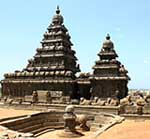Pallavas
The Tamil society witnessed a great change during the Pallava period. The caste system became rigid. The Brahmins occupied a high place in the society. They were given land-grants by the kings and nobles. They were also given the responsibility of looking after the temples. The Pallava period also witnessed the rise of Saivism and Vaishnavism and also the decline of Buddhism and Jainism. The Saiva Nayanmars and the Vaishnava Alwars contributed to the growth of Saivism and Vaishnavism. This is known as the Bakthi Movement. They composed their hymns in the Tamil language. These hymns revealed the importance of devotion or Bakthi. The construction of temples by the Pallava kings paved the way for the spread of these two religions.
Education and Literature
The Pallavas were great patrons of learning. Their capital Kanchi was an ancient centre of learning. The Ghatika at Kanchi was popular and it attracted students from all parts of India and abroad. The founder of the Kadamba dynasty, Mayurasarman studied Vedas at Kanchi. Dinganaga, a Buddhist writer came to study at Kanchi. Dharmapala, who later became the Head of the Nalanada University, belonged to Kanchi. Bharavi, the great Sanskrit scholar lived in the time of Simhavishnu. Dandin, another Sanskrit writer adorned the court of Narasimhavarman II. Mahendravaraman I composed the Sanskrit play Mattavilasaprahasanam. Tamil literature had also developed. The Nayanmars and Alwars composed religious hymns in Tamil. The Devaram composed by Nayanmars and the Nalayradivyaprabandam composed by Alwars represent the religious literature of the Pallava period. Perundevanar was patronized by Nandivarman II and he translated the Mahabharata as Bharathavenba in Tamil. Nandikkalambagam was another important work but the name of the author of this work is not known. Music and dance also developed during this period.
Pallava Art and Architecture
 |
| Shore temple |
Information related to the search:
Pallavas, pallavas, india, pallava, temples, composed, tamil, history, kanchi, period, temple, architecture, sanskrit, alwars, literature, hymns, nayanmars, society, developed, religious, work, witnessed, ancient, writer, saivism, vaishnavism, kings, learning, given, bakthi

